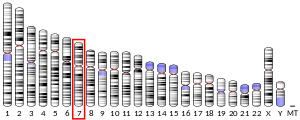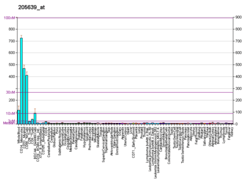AOAH
Acyloxyacyl hydrolase, also known as AOAH, is a protein which in humans is encoded by the AOAH gene.
| AOAH | |||||||||||||||||||||||||
|---|---|---|---|---|---|---|---|---|---|---|---|---|---|---|---|---|---|---|---|---|---|---|---|---|---|
| Identifiers | |||||||||||||||||||||||||
| Aliases | AOAH, acyloxyacyl hydrolase | ||||||||||||||||||||||||
| External IDs | OMIM: 102593 MGI: 1350928 HomoloGene: 1238 GeneCards: AOAH | ||||||||||||||||||||||||
| |||||||||||||||||||||||||
| |||||||||||||||||||||||||
| |||||||||||||||||||||||||
| |||||||||||||||||||||||||
| Orthologs | |||||||||||||||||||||||||
| Species | Human | Mouse | |||||||||||||||||||||||
| Entrez | |||||||||||||||||||||||||
| Ensembl | |||||||||||||||||||||||||
| UniProt | |||||||||||||||||||||||||
| RefSeq (mRNA) | |||||||||||||||||||||||||
| RefSeq (protein) | |||||||||||||||||||||||||
| Location (UCSC) | Chr 7: 36.51 – 36.72 Mb | Chr 13: 20.79 – 21.04 Mb | |||||||||||||||||||||||
| PubMed search | [3] | [4] | |||||||||||||||||||||||
| Wikidata | |||||||||||||||||||||||||
| |||||||||||||||||||||||||
Function
Acyloxyacyl hydrolase (AOAH) is a lipase that selectively releases the secondary (acyloxyacyl-linked) fatty acyl chains from the hexaacyl lipid A moiety found in many bacterial lipopolysaccharides (LPSs, also called endotoxins). The resulting tetraacyl LPS is non-stimulatory and can be a potent inhibitor of LPS sensing via the MD-2--Toll-like Receptor 4 (TLR4).
The enzyme's 2 disulfide-linked subunits are encoded by a single mRNA. The smaller subunit is a member of the saposin-like (SAPLIP) protein family and the larger subunit, which contains the active site serine, is a GDSL lipase. The enzyme's 3D structure and catalytic mechanism were reported by Gorelik et al.
AOAH is produced by macrophages (including Kupffer cells and microglia), dendritic cells (especially in the colon), NK cells, ILC1 cells, neutrophils and renal proximal tubule cells. Absence of the enzyme in genetically engineered mice has been associated with distinctive phenotypes. AOAH-deficient animals are unable to inactivate even small amounts of LPS in most tissues; the LPS remains bioactive and may pass from cell to cell in vivo for many weeks. The LPS-exposed mice develop strikingly high titers of polyclonal antibodies, prolonged hepatomegaly, and innate immune "tolerance" that gives them slow and inadequate responses to bacterial challenge. Absence of the enzyme renders mice more likely to develop severe lung injury and die if they are challenged with intratracheal LPS or Gram-negative bacteria. Other studies found that AOAH reduced translocation of stimulatory LPS from the gastrointestinal microbiota to the lung, where it may induce tolerance in alveolar epithelial cells; human eQTL studies have linked AOAH deficiency to both increased risk of colitis and protection from asthma. A polymorphism in the AOAH gene has been associated with chronic rhinosinusitis in 2 different ethnic groups.
AOAH has been highly conserved through evolution; the amino acid sequence of the human enzyme is almost 50% identical to that of the AOAH found in Dictyostelium discoideum, with 100% identity in the GDSL lipase consensus sequences. The enzyme has been found in many invertebrates and all vertebrates studied to date except fish. Although mice have many well-established mechanisms for inhibiting LPS, none has prevented long-term persistence of stimulatory LPS in animals that lack AOAH.
References
- Hagen FS, Grant FJ, Kuijper JL, et al. (1991). "Expression and characterization of recombinant human acyloxyacyl hydrolase, a leukocyte enzyme that deacylates bacterial lipopolysaccharides". Biochemistry. 30 (34): 8415–23. doi:10.1021/bi00098a020. PMID 1883828.
- Staab JF, Ginkel DL, Rosenberg GB, Munford RS (1994). "A saposin-like domain influences the intracellular localization, stability, and catalytic activity of human acyloxyacyl hydrolase". J. Biol. Chem. 269 (38): 23736–42. PMID 8089145.
- Hall CL, Munford RS (1983). "Enzymatic deacylation of the lipid A moiety of Salmonella typhimurium lipopolysaccharides by human neutrophils". PNAS. 80 (21): 6671–6675. doi:10.1073/pnas.80.21.6671. PMC 391232. PMID 6356132.
- Coulthard MG, Swindle J, Munford RS, et al. (1996). "Adenovirus-mediated transfer of a gene encoding acyloxyacyl hydrolase (AOAH) into mice increases tissue and plasma AOAH activity". Infect. Immun. 64 (5): 1510–5. PMC 173955. PMID 8613354.
- Lu M, Zhang M, Takashima A, Munford RS, et al. (2005). "Lipopolysaccharide deacylation by an endogenous lipase controls innate antibody responses to Gram-negative bacteria". Nat. Immunol. 6: 989–994. doi:10.1038/ni1246. PMID 16155573.
- Shao B, Kitchens RL, Munford RS, et al. (2011). "Prolonged hepatomegaly in mice that cannot inactivate bacterial endotoxin". Hepatology. 54: 1051–1062. doi:10.1002/hep.24488. PMC 3188384. PMID 21674560.
- Zhang Y, Endam LM, Filali-Mouhim A, Desrosiers M, et al. (2012). "Polymorphisms in RYBP and AOAH genes are associated with chronic rhinosinusitis in a Chinese population: a replication study". PLOS ONE. 7: e39247. doi:10.1371/journal.pone.0039247. PMC 3378692. PMID 22723975.
- Fairfax BP, Makino S, Radhakrishnan J, Knight JC, et al. (2012). "Genetics of gene expression in primary immune cells identifies cell type-specific master regulators and roles of HLA alleles". Nat. Genet. 44: 502–510. doi:10.1038/ng.2205. PMC 3437404. PMID 22446964.
- Lu M; Varley AW; Ohta S; Hardwick J; Munford RS (2008). "Host inactivation of bacterial lipopolysaccharide prevents prolonged tolerance following gram-negative bacterial infection". Cell Host Microbe. 4: 293–302. doi:10.1016/j.chom.2008.06.009. PMC 2607035. PMID 18779055.
- Lu M, Varley AW, Munford RS (2013). "Persistently active microbial molecules prolong innate immune tolerance in vivo". PLOS Pathogens. 9: e1003339. doi:10.1371/journal.ppat.1003339. PMC 3649966. PMID 23675296.
- Zou B, Jiang W, Han H, Lu M (2017). "Acyloxyacyl hydrolase promotes the resolution of lipopolysaccharide-induced acute lung injury". PLOS Pathogens. 13: e1006436. doi:10.1371/journal.ppat.1006436. PMC 5489216. PMID 28622363.
- Gorelik A, Illes K, Nagar B (2018). "Crystal structure of the mammalian lipopolysaccharide detoxifier". PNAS. 115: E896-E905. doi:10.1073/pnas.1719834115. PMC 5798384. PMID 29343645.
- Qian G, et al. (2018). "LPS inactivation by a host lipase allows lung epithelial cell sensitization for allergic asthma". J Exp Med. 215: 2397–2412. doi:10.1084/jem.20172225. PMC 6122967. PMID 30021797.
- Janelsins BM, Lu M, Datta SK (2014). "Altered inactivation of commensal LPS due to acyloxyacyl hydrolase deficiency in colonic dendritic cells impairs mucosal Th17 immunity". PNAS. 111: 373–378. doi:10.1073/pnas.1311987111. PMC 3890863. PMID 24344308.
External links
- Human AOAH genome location and AOAH gene details page in the UCSC Genome Browser.
- GRCh38: Ensembl release 89: ENSG00000136250 - Ensembl, May 2017
- GRCm38: Ensembl release 89: ENSMUSG00000021322 - Ensembl, May 2017
- "Human PubMed Reference:". National Center for Biotechnology Information, U.S. National Library of Medicine.
- "Mouse PubMed Reference:". National Center for Biotechnology Information, U.S. National Library of Medicine.




